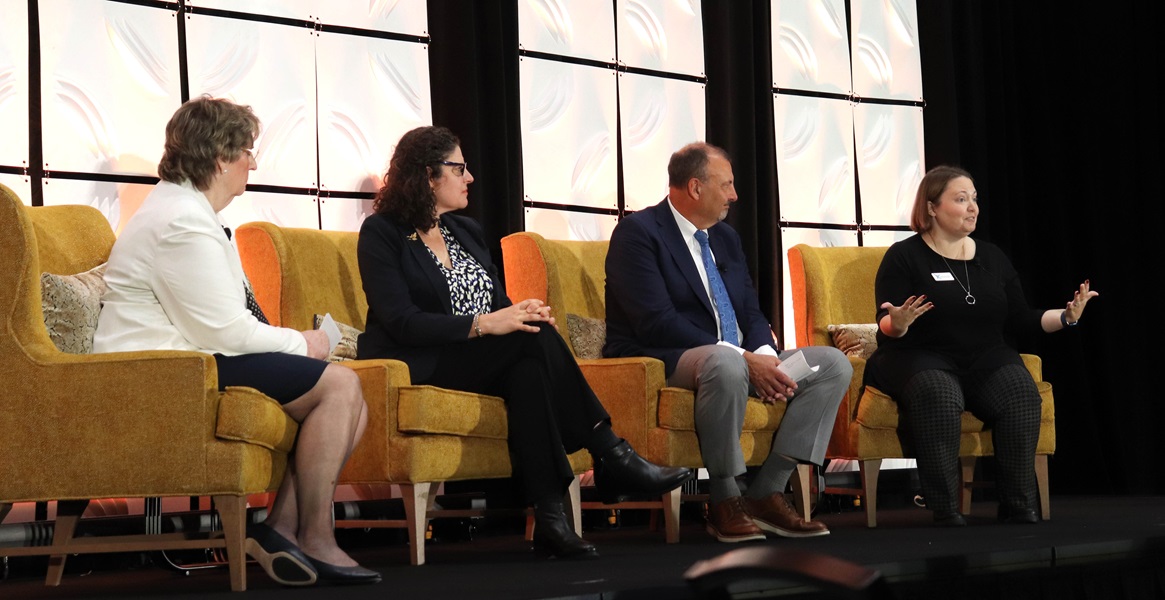
One message came through loud and clear at the 2024 Thriving Children, Families, and Communities Conference: Early childhood advocates can’t fix America’s widespread child care challenges alone.
Finding solutions to complex problems will require a wide array of partners: businesses, employers, chambers of commerce, farmers, legislators, families, faith communities, and more.
Buffett Institute Director of Policy and Thriving Children keynote speaker Linda Smith pointed out the conference’s audience, which included a county sheriff, state legislators, child care providers, and more. The Sept. 17 event drew more than 560 people from Nebraska and beyond.
“So come on, people, let's figure out how to get all of you to the table and figure out what is the plan for Nebraska to move forward,” Smith said during her keynote address.
A keynote panel following Smith’s talk led by example. In addition to Smith, who served as moderator, the speakers were:
- Bryan Slone, Nebraska Chamber of Commerce & Industry president
- Shoshanah Inwood, an associate professor at The Ohio State University who studies farm families and their health insurance and caregiving needs
- Sarah Taylor Vanover, Kentucky Youth Advocates policy and research director
The Thriving Children conference underscores the link between quality early childhood education, healthy communities, and a successful economy. In Nebraska, 72% of young children live in homes where all adults work. Reliable, affordable child care is a necessity for families and employers, many of whom can’t fill job openings.
Nebraska has made progress increasing the number of child care spots available to families, Smith said. But workforce participation is actually dropping.
“Women are not coming back into the workforce at the same levels as before.” Smith said. “Why is that? Because they don't have child care.”
Slone said the business community wants to find solutions to worker and child care challenges—especially creative proposals that don’t result in new taxes or huge cost outlays.
“I do think we can ask businesses to put skin in the game, and they will. Business people are problem-solvers, just like you are,” Slone said.
In states like Alabama, Alaska, and South Dakota, businesses have started pressuring state leaders to invest more in child care, Smith said.
“Alabama, for the first time ever, put money into child care,” she said. “Why? Because the business community, Toyota, you know, some of the big car companies, said, we need to fix this. We need to do something.”
Like Nebraska, Kentucky has two larger urban centers surrounded by many rural counties and towns, Vanover said. Out of 120 counties, 79 are considered child care deserts where families have trouble finding and affording care.
So, Kentucky has turned to several innovative solutions. One involves increasing the number of home-based child care providers. That’s a big need in rural communities where families may live miles from a larger center-based program or need care during nontraditional hours due to jobs in fields like health care, manufacturing, or agriculture.
The Family Child Care Network of Kentucky helps home-based providers start and sustain child care businesses.
“Let us give them a startup grant,” Vanover said. “We'll help them pay their zoning fees. We'll help them make their first insurance payment. We'll help them make sure their home is safe, and then they can be a small business owner and start their own program.”
In 2022, Kentucky began offering subsidies to child care workers. They can get free or reduced care for their own children as an incentive to remain in the early childhood workforce and as a way to augment traditionally low pay. Child care workers there make, on average, $12.39 an hour, Vanover said.
Inwood, a rural sociologist, said child care is an under-the-radar issue for many farm families, even as the number of farms across the country continues to shrink.
“A lot of states have been investing in trying to grow the next generation of farmers and ranchers and trying to invest in access to capital and credit and land access, which is all really important,” Inwood said. “But really, we've been overlooking some of the social and household-level issues that are affecting farm families. And 1 in 2 farmers, 48%, say access to child care is important to the economic viability of their farm business.”
Farm work can require long hours and dangerous equipment, she said, but most farm families bring their children to work because they have no other option.
Vanover encouraged early educators and child care advocates to bring policymakers and legislators outside-the-box solutions.
“Child care providers have never been our own best advocates. We are in it for the love of the kids, and we know that we're going to make low pay and we just do it,” she said. “But now is the time for child care providers to step up and advocate for themselves. You are constituents, you are voting members in your community, and if you ... go out there and really use your voice, then I think that's going to make a big impact.”
Erin Duffy is the managing editor at the Buffett Early Childhood Institute at the University of Nebraska and writes about early childhood issues that affect children, families, educators, and communities. Previously, she spent more than a decade covering education stories and more for daily newspapers.

